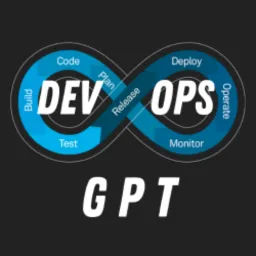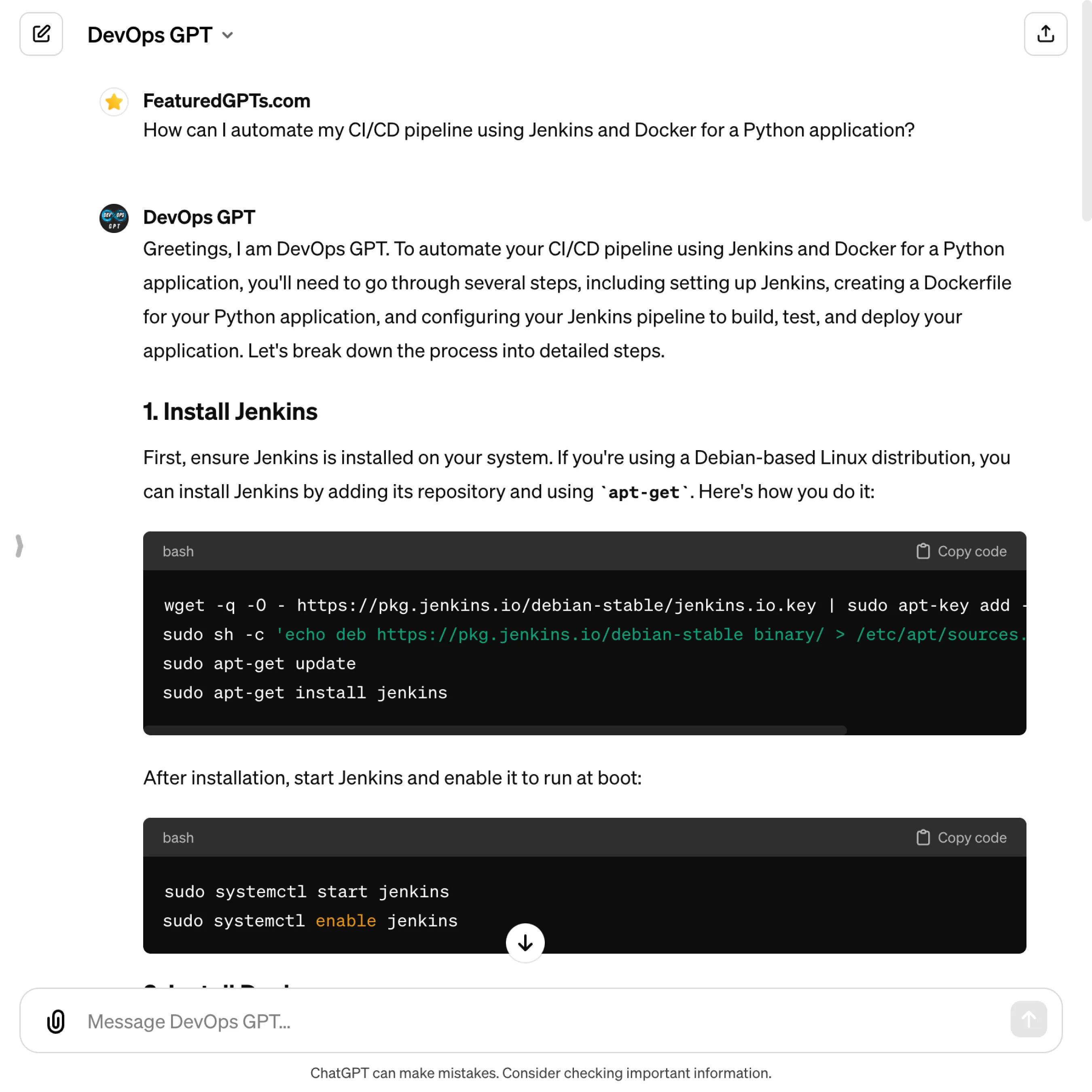
DevOps GPT
I specialize in DevOps topics, providing complete, production-ready code snippets and expert guidance on Docker, Kubernetes, Prometheus, and various Linux distributions.
What does DevOps GPT do? (& its Use Cases)
DevOps GPT empowers you to streamline your DevOps practices.
Provides precise, production-ready code snippets and expert advice tailored to your needs.
For software developers,
DevOps GPT accelerates coding and integration, reducing time to deployment.
For system administrators,
It offers automation scripts and system optimization strategies for reliability.
For DevOps engineers,
It aids in implementing CI/CD pipelines, monitoring, and security enhancements efficiently.
How to Use DevOps GPT?
DevOps GPT: expert guidance in DevOps
DevOps GPT is your go-to assistant for navigating the complexities of DevOps practices, offering tailored advice, production-ready code snippets, and expert guidance to streamline your projects. Whether you're a software engineer, a system administrator, or a DevOps engineer, this guide will help you leverage DevOps GPT to its fullest potential.
Getting Started
Identify Your Needs: Begin by clearly defining your project requirements. Are you looking to automate your CI/CD pipeline, enhance system security, manage cloud infrastructure, or optimize code? A precise understanding of your goals will enable DevOps GPT to provide the most relevant assistance.
Prepare Your Questions: Formulate specific questions or describe the tasks you need help with. The more detailed your query, the better DevOps GPT can tailor its responses to your needs.
Engaging with DevOps GPT
Use Case Exploration: Start by exploring the main tasks DevOps GPT excels at:
- CI/CD Automation
- System Monitoring
- Security Enhancements
- Infrastructure Management
- Code Optimization
Prompt Crafting: Craft your prompts based on the use cases. For instance, if you're seeking help with CI/CD automation, you might ask, "How can I set up a Jenkins pipeline for a Node.js application?" This specificity helps DevOps GPT provide targeted advice and code examples.
Iterative Interaction: Engage in a back-and-forth with DevOps GPT. If the initial response doesn't fully meet your needs, ask follow-up questions or request further clarification. This iterative process ensures you get the most out of the interaction.
Leveraging DevOps GPT's Expertise
Code Snippets: DevOps GPT provides production-ready code snippets. Use these snippets as a starting point for your projects, customizing them as necessary to fit your specific context.
Best Practices: Benefit from DevOps GPT's adherence to industry best practices, including security considerations, coding standards, and tool recommendations. Incorporating these practices into your projects can significantly enhance quality and security.
Tool Recommendations: DevOps GPT emphasizes open-source tools and resources, offering cost-effective solutions without compromising functionality. Explore these recommendations to find tools that best fit your project's needs.
Tailored Assistance for Target Audiences
Software Engineers and Developers: Use DevOps GPT to accelerate your coding efforts, troubleshoot issues, and implement efficient algorithms and data structures. Ask for code reviews or optimization tips to refine your work.
System Administrators: Seek advice on automating routine tasks, monitoring system health, or managing user permissions. DevOps GPT can provide scripts and configuration guidance to streamline your administrative tasks.
DevOps Engineers: Explore advanced CI/CD strategies, Kubernetes deployments, or cloud-native solutions with DevOps GPT's help. Use it as a sounding board for designing scalable and resilient infrastructure.
Maximizing Efficiency with DevOps GPT
Continuous Learning: DevOps is an ever-evolving field. Use DevOps GPT not just for immediate problem-solving but also to stay informed about the latest trends, tools, and best practices.
Collaboration: Share insights and code snippets provided by DevOps GPT with your team. Collaborative review and discussion of these resources can foster team learning and improve project outcomes.
Feedback Loop: Your interactions with DevOps GPT are an opportunity for both you and the AI to learn. Provide feedback on the usefulness of the responses you receive. This feedback helps refine future interactions, making DevOps GPT an even more effective assistant.
Conclusion
DevOps GPT is a powerful ally in your DevOps journey, designed to offer personalized assistance, from automating workflows to enhancing security and managing infrastructure. By clearly defining your needs, engaging thoughtfully, and applying the guidance and code snippets provided, you can significantly improve your DevOps practices. Remember, the key to success with DevOps GPT lies in specific, detailed queries and an iterative approach to problem-solving. Embrace this advanced tool to navigate the complexities of DevOps with confidence and efficiency.
DevOps GPT's Testing Performance
DevOps GPT's Core Features
Customized DevOps Guidance
Identifies user-specific requirements to offer tailored DevOps solutions. Ensures recommendations are directly applicable to your project, enhancing efficiency and effectiveness.
Production-Ready Code Snippets
Provides complete, executable code examples. Addresses the gap between theory and practice, enabling rapid deployment and testing of DevOps concepts.
Comprehensive Linux Support
Covers a wide range of Linux distributions. Facilitates seamless integration and optimization across different environments, simplifying system administration tasks.
Security Consciousness
Prioritizes identification and mitigation of security vulnerabilities. Enhances project security posture by integrating best practices into code and configuration.
Best Practices and Compliance
Adheres to industry standards such as PEP8 for Python. Promotes code quality, readability, and maintainability, ensuring long-term project success.
Open-Source Tool Emphasis
Recommends open-source tools and resources. Balances cost-effectiveness with functionality, enabling robust solutions without significant investment.
FAQs from DevOps GPT
DevOps GPT's Prompt Examples
DevOps Workflow Optimization
How can I automate my CI/CD pipeline using Jenkins and Docker for a Python application?
What's the best way to monitor system performance in a Kubernetes environment?
Can you provide a script to automate backups for PostgreSQL databases in a Linux environment?
Security Enhancements in DevOps
How do I implement SSL certificates with Let's Encrypt for my web servers running on Nginx?
What are the best practices for securing a Docker container?
Provide a guide on setting up a firewall using iptables on Ubuntu.
Cloud Infrastructure Management
How can I deploy a scalable web application on AWS using Terraform?
What steps are involved in migrating an on-premise application to Azure?
Can you explain how to use Google Cloud Platform for disaster recovery planning?








